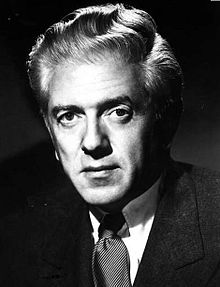
Back أناتول ليتفاك Arabic اناتول ليتفاك ARZ Anatole Litvak Catalan Anatole Litvak Czech Anatole Litvak Danish Anatole Litvak German Ανατόλ Λίτβακ Greek Anatole Litvak Spanish Anatole Litvak Basque آناتول لیتواک Persian
Anatole Litvak | |
|---|---|
 | |
| Born | Anatoly Mikhailovich Litvak 10 May 1902 |
| Died | 15 December 1974 (aged 72) Neuilly-sur-Seine, France |
| Citizenship | United States |
| Occupations |
|
| Years active | 1930–1970 |
| Notable work | Mayerling, Why We Fight, The Battle of Russia, City for Conquest, The Snake Pit |
| Spouse(s) | Miriam Hopkins (1937–1939) (divorced) Sophie Steur (1955–1974) (his death) |
| Awards | Legion of Honour and Croix de guerre, (France); Order of the British Empire, honorary officer; United States Legion of Merit, Bronze Star Medal |
Anatoly Mikhailovich Litvak OBE (Russian: Анатолий Михайлович Литвак; 10 May 1902 – 15 December 1974), better known as Anatole Litvak, was a Ukrainian-born[1] American filmmaker who wrote, directed, and produced films in various countries and languages. He began his theatrical training at age 13 in Petrograd, Russia (now again known as St. Petersburg).
Litvak was notable for directing little-known foreign actors to early fame and is believed to have contributed to several actors winning Academy Awards. In 1936 he directed Mayerling, a film which made French actors Charles Boyer and Danielle Darrieux international stars. He returned Swedish star Ingrid Bergman to popularity with American audiences in 1956 with Anastasia, in which she won her second Oscar. He directed Olivia de Havilland to an Academy Award nomination for The Snake Pit (1948). He directed Jean Gabin in his screen debut and directed Elia Kazan in his earliest acting role, City for Conquest.
Litvak directed Confessions of a Nazi Spy in 1939, starring Edward G. Robinson, which used actual newsreel footage from U.S. Nazi rallies. As a refugee from Nazi Germany, Litvak was among the few directors who tried to open Hollywood's eyes to the threat Germany posed to Europe and the world.
During World War II, he enlisted and co-directed documentaries with Frank Capra, including Why We Fight films. His solo-directed, The Battle of Russia (1943), won numerous awards and was nominated for an Oscar. Because of Litvak's ability to speak Russian, German and French, he supervised the filming of the D-Day Normandy landings. He also filmed aerial warfare with the U.S. Eighth Air Force. He was promoted to full colonel by the end of the war for his volunteer wartime efforts. He received special awards from the governments of France, Britain, and the United States.
- ^ * Barson, Michael (2013). "Anatole Litvak". Encyclopædia Britannica.
- * Decherney, Peter (2016). Hollywood: A Very Short Introduction. Oxford University Press. p. 59. ISBN 978-0-19-994354-8.
- Steinhart, Daniel (2019). Runaway Hollywood: Internationalizing Postwar Production and Location Shooting. Univ of California Press. p. 111. ISBN 978-0-520-29863-7.
- * Matheson, Sue (2016). The Westerns and War Films of John Ford. Rowman & Littlefield. p. 68. ISBN 978-1-4422-6106-8.
© MMXXIII Rich X Search. We shall prevail. All rights reserved. Rich X Search